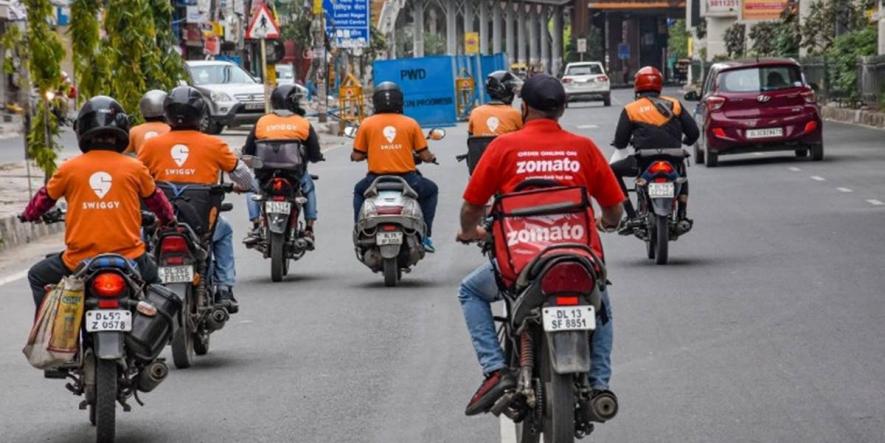Gig Workers Need Recognition as Workers, Not Hollow Promise of Separate Social Security

Image credit: PTI
A gig work-based economy has been propagated as a new form of micro-entrepreneurial economy in the last few years. It is a form of work where regular perennial work has been assigned on a gig basis i.e. without any employment contracts, thereby marketing flexibility to the workers only for the shareholders to have a more extensive control over the workforce and production.
As per NITI Aayog, the Indian IT-based service sector early this year had about 7.7 million gig workers and by further propagating such policies, it estimates this workforce to quadruple by the end of this decade. At the same time, the government projected that by including gig work as a separate section in the Code for Social Security in 2020, it took a major step. The policy researchers working on this topic have all been discussing the implementation of social security for gig work and Rajasthan has just come up with the same in a recently passed bill.
We need to first understand where we are at as far as the policies and discussions related to gig work are concerned. Sometime in the middle of the previous decade in India, this new form of work started being marketed as a policy in our economy. Foreign investors and Indian investors alike invested big in organisations like Uber, Ola, Zomato, Swiggy, Urban Company, etc. in a market where the operational cost was simply not sustainable to bring the large set of Indian consumers on to using app-based services. Uber invested $1 billion in 2015 to capture the Indian market. Despite the model, not seeming operationally profitable, these large investments were made to lure both the customers and gig workers to the app for solely one reason. The investors and the company executives alike understood the flexibility and power which this new form of work brought to them. They propagated and also lobbied for years because they believed they had found a way around the existing labour laws to define independent workers with temporary contracts. The flexibility has ensured that the companies can change the rate, working hours, and working conditions of workers subjected to conditions way worse than full-time employees by mere notification.
Now when different levels of duopoly and monopoly were achieved in the market, like Ola and Uber in cabs, Swiggy and Zomato in food delivery, and Urban Company in home-based services, especially beauty and saloon, it was time for the investors to put their lucrative theory into action. We had waves of the COVID-19 pandemic in 2020-21 followed by the ongoing Russia-Ukraine war that started in February 2022. This has led to a more or less continuous recession in the global markets. Even though the IT sector benefited in the pandemic as more traditional operational services were looking to digitise, the investors have seen this as an opportunity to launch a full assault on gig workers in order to create a profit margin in this sector. We suddenly saw huge cuts in the base piece rates of the workers, reduction in various incentives, algorithmic manipulation to avoid incentives, lack of renewal of insurance for workers, lack of a minimum time-based guarantee incentive, temporary and permanent blocking from the app, etc. The policies were obviously brought in without consultation with the workers who are still referred to as partners by the company. These so-called partners were forced to work continuously way beyond the eight-hour workday, without any social security, insurance, or guarantees of any kind. They could be blocked permanently by the apps and as a result of all this, we have been seeing many spontaneous attempts at organising and unionising by the gig workers and a debate on the policy level over ensuring at least social security for them.
When we consider the history of the development of this form of work, it becomes clear how these debates on policies are way behind what is needed for the workers facing the current predicament. We are talking about the conditions of slavery which have already made the work conditions illegal as per the existing laws of the country and yet, we are asking for a separate law and a separate category of definition for the gig workers only for some social security. The scenarios created are violating not just workers’ rights but the most fundamental human right, the right to life, and all we are demanding is the identification of a separate category of work. The most important thing to focus on is the perennial nature of work. If the nature of work is perennial and not just additional seasonal work, it already created a sense of insecurity when workers were enrolled on this full-time. If the policymakers had the voice of worker representatives as unions or federations, we would hear this in policymaking years ago.
A case for Ola and Uber gig workers has been pending in the Delhi High Court since 2017 on determining the worker-employer relationship in these cases. The case is pending on determining the control the company has on these workers. The control is based on wages, working conditions, working hours, hiring and firing, etc. If we analyse what has been going on in these app-based companies in recent times, we realise that clearly, the companies have full control over this. In fact, this control was the reason why perennial work was marketed in gig fashion in the previous decade. The Urban Company workers have been unionising all over the country over the sudden permanent blocking of IDs by the company. Swiggy and Zomato workers have been striking in various places for three years over rate and incentive cuts and similar cuts have been seen all over the sector. Urban Company has been forcing employees to log in even up to 15 hours a day. They need to have a response rate of over 80% (accepting over 80% of jobs which come to them) to avoid permanent blocking. They are even forced to purchase the products used by customers from the company at inflated prices. Where is the flexibility and choice which the gig workers were promised? Rather, now the slavery-like conditions have been created where there is a naked violation of existing worker and human rights and it is time to argue for the employment status and benefits where social security is a basic guarantee.
Our labour laws, which cover industrial as well as commercial establishments, factories and shops, have provisions for independent contractors, piece-rate workers, and all workers of industrial establishments who are not covered by the Factories Act. These acts ensure fair working hours, wages and working conditions for the gig workers who check all the boxes. The primary reason why these laws have not been implemented in this sector till now is because of a lack of voice of worker representatives in the sector. Minimum wages, leaves, working hours, maternity benefits, ESI, PF, etc. are already legally ensured to all workers; it is only the lobbying by the industry and one-sided arguments which has denied gig workers the status of workers. Whether we test the company over the parameters of control or the work conditions of all these full-time workers, whether piece rate or time-based or on the nature of work which is clearly perennial, it becomes clear that the gig workers are workers who need to be legally recognised as workers. Social security is the bare minimum guarantee as per the existing laws when you are recognised as a worker.
If we look at the international stage, countries like the UK have recognised Uber drivers as full-time workers with social security guarantees and various tests of employment have been formed in the US. These are the countries from which the Indian industrialists borrowed the concept of gig work. All this has been possible because of unions of gig workers who have fought for it. The unionised gig workers in our country also need the same voice in the labour departments and tribunals in order to hear the other side of the argument. This must generate a re-reading of our existing laws thereby creating the grounds for recognising gig workers as full-time workers and having social security as their right instead of getting them a special category with some social benefits. It is also time for the unions to have their voices heard in these policy-making discussions which are currently one-sided and heavily tilted in the favour of the industrial investors. That is how we ensure that such heavy conditions of control are not brought in by the industry to exploit workers as slaves.
The writer is the coordinator for the All India Gig Workers’ Union (AIGWU), affiliated with the CITU. The views are personal.
Get the latest reports & analysis with people's perspective on Protests, movements & deep analytical videos, discussions of the current affairs in your Telegram app. Subscribe to NewsClick's Telegram channel & get Real-Time updates on stories, as they get published on our website.






















